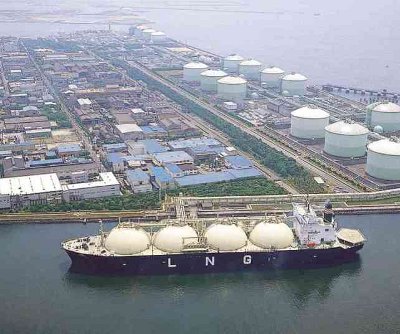You may already know that the U.S. is producing natural gas in such quantities that companies have to burn off, or “flare,” excess gas. It’s a terrible waste. Compounding the problem, the U.S. doesn’t have a high-profile gas export infrastructure, even though markets over in East Asia are hungering for it.
The problem is that gas exports cut both ways. In the short term, certainly, they are hugely attractive. They would generate thousands of U.S. jobs, they would rake in revenues and profits for energy companies, and so on.
 The flip side is that this model is not sustainable in the longer run. The cost difference between the low prices here in the U.S. and the high prices over in Asia would slowly erode as prices strive toward parity.
The flip side is that this model is not sustainable in the longer run. The cost difference between the low prices here in the U.S. and the high prices over in Asia would slowly erode as prices strive toward parity.
Once that happens, you can say goodbye to the happy days of cheap natural gas.
And that’s also why the Obama administration has been hesitant about moving forward with free-for-all energy exports despite strong lobbying from interested parties. There are certain considerations at stake.
Obviously, U.S. trade would benefit hugely, but more importantly, other natural gas producers (think Russia and Iran, mainly) would be thwarted to a degree. Right now, the Obama administration is deliberating over 20 gas export terminal applications. Should they all be approved, we’ll soon be exporting around 41 percent of all the gas we’ll have produced through 2013.
The situation has become so serious that a decision one way or another could appear within the next few weeks, reports Bloomberg.
The Export Debate
However, the U.S. has a hangover from the decades when the nation was dependent on massive amounts of energy imports. That sort of thinking has many wary about going ahead with exporting gas. It’s just such an abrupt turnaround.
Thus, Dow Chemical Co. (NYSE: DOW) is opposing Exxon Mobil (NYSE: XOM). The former (along with other natural gas users) want to move against the latter (along with other producers) in letting “the market” decide how much can be exported internationally. As described earlier, tipping the balance too far in favor of international exports will mean the erosion of domestic competitive advantage.
Bloomberg reports on the state of affairs:
“We still have a psychology about energy that’s based on the very lengthy period of time when America was so dependent on imports that it was creating energy-security issues,” Spencer Abraham, a former U.S. energy secretary who has worked with gas exporters since leaving office, said in an interview. “Nobody would be advocating this if we only had 10 more years of natural gas supplies. The fact is that we have at least a century or more.”
Indeed, we’ll see production levels reach a record average of 69.9 billion cubic feet per day over 2013. Overall, gas production has increased by 28 percent within the past ten years.
Our analysts have traveled the world over, dedicated to finding the best and most profitable investments in the global energy markets. All you have to do to join our Energy and Capital investment community is sign up for the daily newsletter below.
Exporting Natural Gas: A Fragile Balance
The argument for exporting surplus gas is strong in a time when the domestic recovery plods along and the general global economic climate remains balmy.
Cheniere Energy (NYSE: LNG) received federal approval last year in April to go ahead with a $10 billion natural gas export facility in Louisiana. That terminal is expected to commence exporting from 2015. Other applications remain pending.
Last December, the Energy Department decided that allowing natural gas exports to go ahead would result in an overall benefit to the U.S. That decision was hailed by producers and exporters – but again, the catch here is that it will certainly be a very good thing for us, but only in the short term.
The key thing to control is “how much” and “for how long.” Begin exporting too much, too soon, and the cheap domestic natural gas prices will suddenly start to go up. And that upsets everyone.
Right now in Louisiana, gas prices hover around $3.90 per million British thermal units. Over in the U.K., that’s $9.81. Japan was seeing prices around $19.83 in February.
For the President, a rash approval could have serious repercussions (second term or not). That’s one more reason why the White House has been deliberating for so long.
Another thing to bear in mind is that a green signal for natural gas exports could lead to a sudden increase in the number of fracking and horizontal drilling operations going on throughout the nation, as more and more operators will seek to cash in on the action. With prices this low, it’s becoming increasingly unfeasible for further production to keep going. And that’s why the President needs to make a decision sooner rather than later.
If you liked this article, you may also enjoy:


